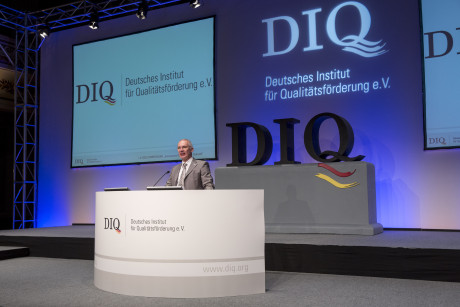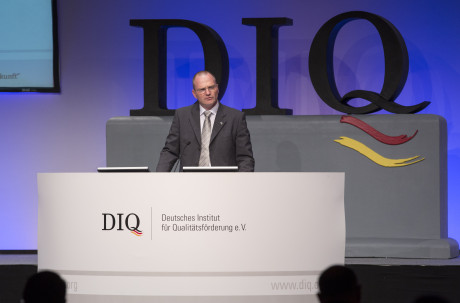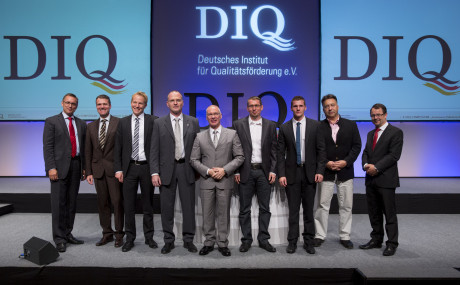30. September 2014
Interdisciplinary exploration of the issue
Man – Machine – Where’s the problem?
Results and recommendations of the 4th symposium held by the German Institute for Quality Improvement (DIQ).
Autonomous driving is the latest pet subject of the automotive industry. And it is now also being taken up by the German Institute for Quality Improvement (DIQ) in its 4th symposium. The vision of passengers reading their newspaper and drinking coffee in a car that drives independently and automatically has become fixed in many people’s minds. In technical terms, driving without driver no longer necessarily poses a problem. But what will the human body feel if it is exposed to sudden unforeseeable changes in direction? And how should the legal issues of the subject be approached? Do people accept the new, commanding technology, and what does psychology have to say? Answers were provided in Wuppertal at the 4th DIQ symposium.
In his welcoming speech, the president of the German Institute for Quality Improvement, Dipl.-Ing. Peter Schuler, explained the activities of the institute. He emphasized the engagement of the DIQ for the safety of people in Germany, most of all where road traffic is concerned. In this context, Peter Schuler evoked the three symposia held so far, and pointed out that the interdisciplinary consideration of their respective subjects is a kind of unique characteristic. The DIQ symposium is the original, he said.
The director of the symposium, Prof. Dr.-Ing. Peter König from Trier University of Applied Sciences, then got the plenum in the mood for the topic of autonomous or automated driving with an entertaining keynote speech. The subject itself was next broached by flight captain Thomas Mildenberger from the Cockpit union. Why the introductory words on autonomous driving should be spoken by a pilot, of all people, quickly emerged. Starting point for captain Mildenberger’s deliberations was the question of the pilot’s role in automated flight. Experience and training are indispensable for pilots, captain Mildenberger said, because they are required to make the ultimate decisions, especially in emergencies, even if there is a high degree of automation. Vivid for the audience was the example of an air freighter that had been hit by a rocket shortly after takeoff and was safely returned to the airfield by the pilots’ intervention. “The crew had to teach themselves how to fly all over again in real time”, said Thomas Mildenberger. He also highlighted the extremely short time spans available for decision-making and interventions in the automatic system. In addition to this, flight captain Mildenberger also provided the audience of the DIQ symposium with an insight into the statistics on safety in air traffic, as well as a presentation of the interface between man and machine, i.e. the aircraft cockpit. In doing so he also addressed the benefits and disadvantages of automated flight. The presentation by Prof. Dr. Frank Schmäl was all about people. Or to put it more exactly, the sensations of the human body in autonomous driving. In his work at the ENT centre in Münster-Greven, Prof. Dr. Schmäl studies kinetosis, the so-called motion sickness. He explained its biological premises to the audience of the DIQ symposium, such as the structure and function of the organ of equilibrium. Amongst others, the reactions of kinetosis include vertigo, without this being adequately buffered. Up to ca. 10 % of the population are highly susceptible, while a comparable number are insensitive to it. Kinetosis declines with advancing age, said Professor Dr. Schmäl. Kinetosis also includes seasickness and travel sickness, amongst others. Prof. Dr. Schmäl sees the connection between kinetosis and autonomous driving, and the resulting problems, in various situations. For example that the driver is not steering the vehicle, but doing something else, for instance with a tablet PC. The motions of the vehicle, and hence also of oneself, are not registered visually – a difficult situation. Prof. Dr. Schmäl also speaks of a conflict of the senses between the visual and vestibular (gravity- and acceleration-determining) information. But Prof. Dr. Schmäl also perceives promising approaches to the avoidance of kinetosis in autonomous driving. The movements of the vehicle must be communicated to the passenger visually. He recommends mediation of the vehicle’s motions to the passenger by way of a monitor. This was further fleshed out by Dipl. Ing. Dominique Bohrmann from the Institute of Vehicle Technology at Trier University of Applied Sciences. He introduced solutions that have a positive effect on car passengers for reducing the nausea caused by equilibrium-disturbing movements. These for example include a seated position, elimination of chassis vibrations, tilting technology in rail traffic, displays and interior lighting, ventilation and air conditioning.
Dipl.-Ing. Philipp Themann had travelled to the DIQ symposium in Wuppertal from the Institute for Motor Vehicles at RWTH Aachen University. In his presentation, he traced the way from driver assistance systems to automated driving. The motivation for and goal setting towards automated driving are clear, according to Themann. People wish to enjoy driving while minimizing consumption, want more safety with less mass, and driving pleasure despite driving safety interventions. The final objective is the vision of a driving experience free from accidents and emissions, he said. In his overview of the development of driver assistance systems, Dipl.-Ing. Philipp Themann pointed out that automation is enabled by sensor technologies. He highlighted the various missions and functions of the assistance systems in great detail, along with their interactions. In the process he also explained the various automation levels, from level 0 (driver only) via levels 1 (driver assistance), 2 (partly automated), 3 (highly automated) and 4 (fully automated) through to level 5 (driverless). In Philip Themann’s opinion, the safety of automated driving needs to be ensured on a regulatory, legal, ergonomic, psychological and technical level. Standardization must be the objective. How the human psyche deals with the automation of car driving, and which aspects need to be considered on the basis of these findings – this was discussed at the DIQ symposium by the psychologist Tobias Ruttke from Friedrich-Schiller University in Jena, where he works at the Chair for Occupational, Industrial and Organizational psychology. Tobias Ruttke introduced the subject with a provocative quote from legendary racing driver Juan Manuel Fangio: “Dozing off at the wheel of a moving car is one of the best antidotes to getting old.” The psychologist points out that traffic is complex and dynamic, and more than the mere driving of vehicles – and that traffic is also behaviour, naturally. One should never neglect the emotion that influences the driving directly. By illustrating human misconduct in road traffic, Tobias Ruttke inter alia comes to the conclusion that human behaviour is imbued with error and that errors and failures are also a human operating and learning principle in the car. In his conclusion, the psychologist warns against a technology-oriented atomization of the overall task in automated driving. In his opinion, the controllability of automated systems by the person always needs to be ensured. What is called for in Tobias Ruttke’s opinion is not the replacement of the driver’s competences by the system, but their enhancement and development. For him, human thoughts, feelings, actions and mistakes are as much part of the traffic system as the technology and organization. At the Chair of Criminal Law, Criminal Procedure, Legal Theory, Information Law and Legal Informatics of the Faculty of Law at Würzburg University, Prof. Dr. Dr. Eric Hilgendorf busies himself with legal questions arising from technical progress in the field of robotics. In his presentation at the DIQ symposium, the legal scholar mentioned that autonomous driving is of great social importance and that the legal problems are many. He referred to the fact that constitutions are not regulating the trade with new technological developments. The freedom of research holds true. Cars are increasingly networked, and data downloads in driving vehicles the norm by now. Prof. Dr. Dr. Hilgendorf also raised the liability question for accidents in autonomous driving mode. Will the programmer be liable, or the car dealer? In the European e-commerce directive, for example, the dealer’s liability applies, he said. In his conclusion, Prof. Dr. Dr. Hilgendorf highlights that many areas of law are concerned, such as road traffic law, civil liability, criminal liability, owner liability, and data protection. Some of the problems can be solved by way of interpretation, while others call for new laws. “All the legal problems of autonomous driving are resolvable” was the bottom line of Prof. Dr. Dr. Eric Hilgendorf’s presentation at the DIQ symposium.
“Whether we will be able to use fully autonomous vehicles that don’t need any driver at all under our current traffic conditions still remains very much in doubt for the time being.” This is how the director of the symposium, Prof. Dr.-Ing. Peter König, sums up the interesting contributions by the panel of experts, while pointing out that we are not yet able today to replace human beings with their intuition and fast adaptability to new critical situations by software. All the experts nonetheless agreed that we will also greatly benefit from the automated systems as a preliminary stage of autonomous driving. They provide people with growing relief in guiding their vehicle and are, given the significant improvements of the traffic flow, energy efficiency and road safety, key technologies for the mobility of the future. “As the symposium has clearly demonstrated to us, the technology-oriented perspective on the issues of autonomous or automated driving, so frequently found in the public at large, is not enough. Only a comprehensive, interdisciplinary approach that pays greater heed to the human factor, for example where feelings, behaviour or the importance for society are concerned, can lead to the desired result”, was how Thomas Koch, managing director of the DIQ, put it in his summing up. Thomas Koch invited all those present to the 5th DIQ symposium on September 25, 2015, in Munich.
Bei Veröffentlichung bitten wir um ein Belegexemplar. Vielen Dank!
Bei Rückfragen wenden Sie sich bitte an presse@diq.org oder telefonisch an die Nummer 0681 9987-0.
Deutsches Institut für Qualitätsförderung e. V. (DIQ)
Bismarckstraße 37
66121 Saarbrücken
Telefon: +49 681 9987-0
Telefax: +49 681 9987-123
E-Mail: presse@diq.org
Internet: www.diq.org







